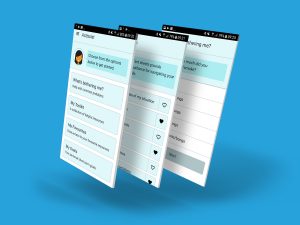Actissist case study
A CBT-informed app that delivers timely, personalised care that reduces the risk of distressing psychotic experiences.
The challenge
Severe mental health problems such as schizophrenia affect 24 million people worldwide. Psychosis typically develops in early adulthood and up to 80% of patients relapse within five years.
National clinical guidelines recommend a treatment known as cognitive behavioural therapy (CBT) for people who have experienced psychosis. We wanted to find a way to increase access to helpful strategies for people experiencing psychosis for the first time.
The research
We are developing a CBT-informed mobile phone app (Actissist) for people who have experienced a first episode of psychosis.
Actissist is intended to:
- help patients better identify the early warning signs of psychosis;
- deliver treatment at the point that it is needed most;
- improve patients’ ability to function day-to-day;
- enhance patients’ overall quality of life;
- potentially reduce demand for NHS services.

The Actissist app was developed and trialled over a 26-month period in a study with 24 patients to make sure that it is safe, practical and accepted by patients as an effective way to treat psychotic and other distressing experiences.
Following additional grant funding, the app was further developed and is currently undergoing a large-scale, randomised controlled trial (RCT), which is due to complete in October 2020. This trial aims to find out whether people like using the app and whether it improves people’s mental health.
Actissist is led by Sandra Bucci, Professor of Clinical Psychology at The University of Manchester, and is a multidisciplinary collaboration.
Digital Health Software and Platforms’ contribution
Our team has worked closely with the research team to develop the app throughout the project.
We followed a scrum methodology to enable changes in requirements to be incorporated regularly through the development lifecycle.
We have continued to develop and support the app throughout the RCT.
Our key people
- Matt Machin – co-investigator
The impact
Actissist is unique in applying comprehensive and theory-driven clinical techniques to digital treatments, delivered in real-time, to patients with severe mental health problems.
This research has the potential for broad-ranging impact with benefits to patients, the NHS, healthcare professionals, the national and international scientific communities, and government policies.
Potential for replication
As Actissist is a platform technology that can be applied to a range of both mental and physical health problems, this research is of keen interest to healthcare academics, as well as computer scientists and informaticians across institutions worldwide.
This research also helps further advance and understand how technology can help deliver new health and care treatments. By using rigorous scientific methods, the app allows other innovators to develop further mental health interventions using the Actissist model.
Meeting NHS priorities
As self-management is a cornerstone of NHS policy, this research addresses established NHS England priorities in the area of severe mental health treatment policy.
Further reading
You can find out more by reading the publications available on the Actissist website, particularly A theory-informed digital health intervention in people with severe mental health problems.
This focuses on the collaborative approach used by the research and software teams, and was jointly presented by Sandra and Matt at the MedInfo 17th World Congress in Lyon in August 2019.
Contact us
If you would like to discuss how the Digital Health Software and Platforms team can help with your project, please get in touch by contacting us.
